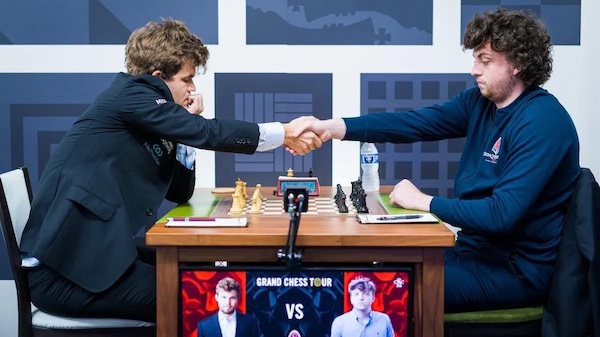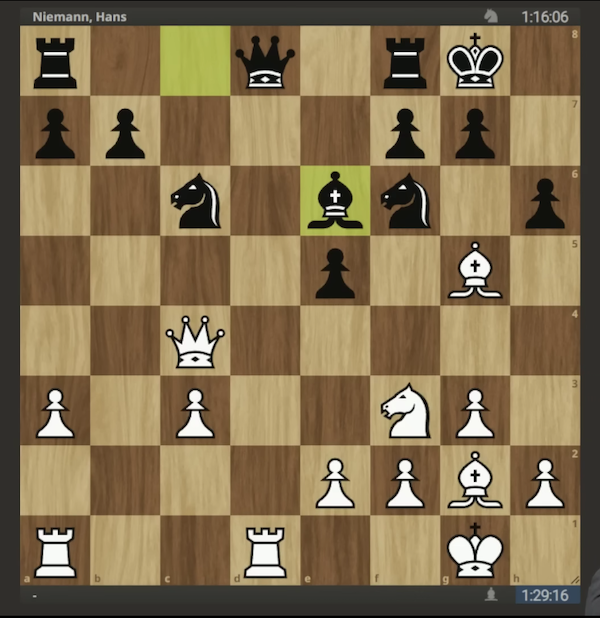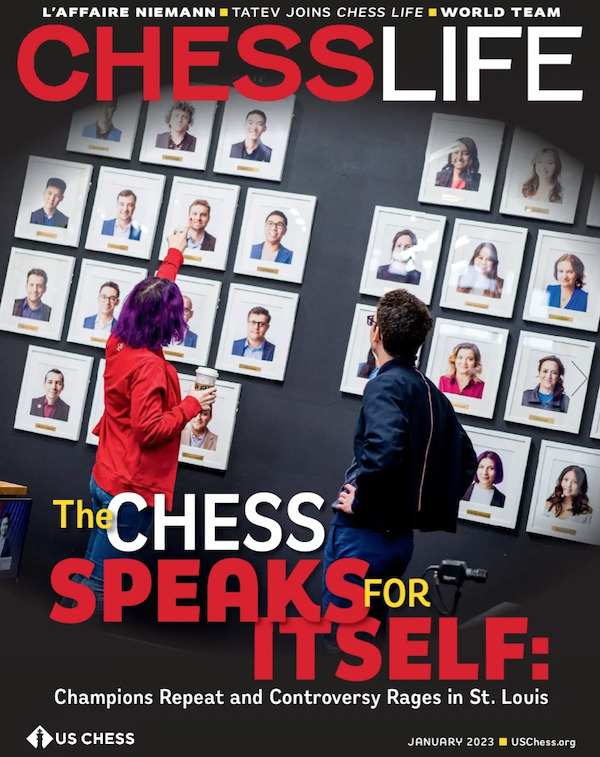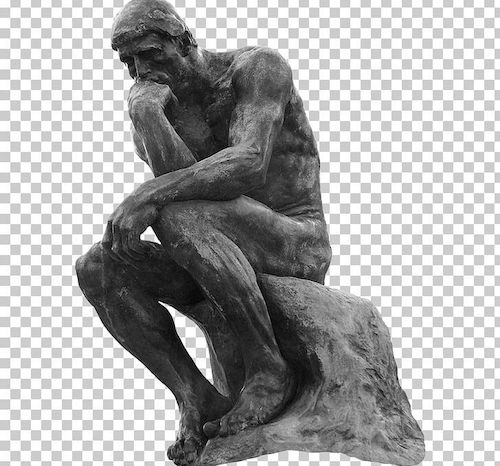Chess Controversies
With the recent Hans Niemann "cheating" scandal, the chess community has been in a dither; you can read about or watch or listen to various aspects of the coverage of this matter here. Did he cheat in his game at the Sinquefield Cup against Magnus Carlsen? Or is he being unfairly maligned?
Click on a tab below to reveal the links for that topic. Material about the scandal comes in many different forms: articles, videos and podcasts.

Magnus Carlsen and Hans Niemann
Thematic Links - Under Construction
Half a Loaf is Better Than None (Hopefully)
The Game - Sinquefield Cup: September 4th, 2022
- The Game That Broke the Internet - Carlsen vs Niemann - Epic Chess - 09/07/2022 [13:41]
- Magnus Carlsen vs Hans Niemann, Round 3 Sinquefield Cup 2022. Carlsen withdrew after this game and a chess cheating scandal has ensued, various theories, from anal beads to leaked prep, have followed but Hans Niemann has remained defiant, stating that he did not cheat!

- Watch the game and form your own opinion. Links to information about the controversy, the coverage, the speculation, the "evidence", the law suit, and even attempts to engineer the beads are below (and on the other tabs on this page). Plus various articles which attempt to explain the whole affair.
- AFTER THE GAME:
- Magnus Carlsen withdraws from the Sinquefield Cup - Chess24
- Hans Niemann hits back over 'cheating' controversy in St. Louis - The Guardian - 09/09/2022
- Hans Niemann hits back at his critics - Chess24
- Niemann: I Have NEVER Cheated Over The Board | Round 5 - Saint Louis Chess Club - 09/06/2022 [28:28]
Chess World Flips Out! - Everyone Has an Opinion
- GM Ben Finegold: Did Hans Cheat? - GMBenjaminFinegold - 09/07/2022 [8:59]
- More to come [probably]
The Accusation - "Hans Cheated!"
- Magnus Believes Hans Niemann is a Cheater - GMHikaru - 09/26/2022 [16:09]
- This topic is under construction.
More Video or Article Title(s) or relevant website(s) or images will be here.
Opinions, Theories, Analysis, Research & Evidence - Guesses [vs. Proof?]
- Chess Cheating Detection 101 - How world renowned expert Dr. Ken Regan analyzed Hans Niemann - Chess & Tech - 09/24/2022 [11:27]
In an interview with the world renowned expert in chess cheating detection, Dr. Ken Regan, the case of Hans Niemann was studied through his methods, covering all the games and events played in the period of September 2020 - September 2022. His conclusions and methods were explained in great detail in a video spanning almost an hour. This video aims to summarize those methods to explain how he reached his conclusions and verdicts regarding the chess cheating controversy initiated by Magnus Carlsen and his open complaints. - The most incriminating evidence against Hans Niemann - Yosha - Echecs - 09/25/2022 [23:07]
- Chess Cheat Detection Expert, IM Kenneth Regan Shares his Findings on the Carlsen/Niemann Scandal - PerpetualChessPodcast - 10/18/2022 [1:29:55]
This week we are rejoined by Dr. Kenneth Regan. Dr. Regan is, as many of you will are already aware, is one of the world's leading experts at engine cheat detection. He is an IM at chess, and is the rare individual with domain expertise in chess, statistics and computer science. Dr. Regan has degrees in mathematics from Princeton and Oxford and is a Professor in Computational Complexity Theory at the University of Buffalo. As a chess player, Ken was the 1977 US Junior co-champion and once held the record of youngest USCF Master since Bobby Fischer. Dr. Regan joined the podcast to share some of his findings about the Carlsen/Niemann controversy and to discuss chess cheating more generally.
- the-carlsen-niemann-affair - ChessBase
- the-hans-niemann-case-numbers-what-they-reveal-and-what-they-do-not-reveal - ChessBase
- The Hans Niemann Report - Chess.com
The Lawsuit - Libel and Slander
- Hans Niemann Files Lawsuit For $100,000,000 - GothamChess - 10/20/2022 [20:14]
- I Read the Hans Niemann Lawsuit (So You Don't Have To!) - 64: A Chess Channel - 10/21/2022 [30:48]
- A Chess-Playing Lawyer Explains The Hans Niemann Lawsuit For $100,000,000 - Chess Vibes - 10/22/2022 [2:35]
- Niemann Sues Carlsen, Chess.com and Nakamura. Law Professor David Franklin joins to Assess the Case - Perpetual Chess Podcast - 10/22/2022 [49:17]
- Hans Niemann sues Magnus Carlsen for $100 million, accusing him of defamation - NPR [10/21/2022]
- Chess.com Officially Acquires Play Magnus, Carlsen Signs As Ambassador - Chess.com
- Various commentators and organizations have weighed in on the controversy, in addition to summarizing the history of the scandal. Sometimes they offer their assessment of the merits of the accusations. Sometimes they are just trying to explain what happened (and, inevitably, some versions are more enlightening than others). Choice is good, but it can be a bit overwhelming to have so many different explanations; there is often overlap between reporting and commentary, so I have shared the same link for commentary here in Theories, Research & Investigations [above] when it seemed appropriate.

- NPR - OnPoint - 10/19/2022 [49:21]- AUDIO
- How to Cheat in Chess: The Great Scandals Throughout History - Diario AS [10/05/2022]
- Collusion, Cheating and the Cold War: The many scandals to have rocked the world of chess - Sky News [09/27/2022]
- Cheating in Chess: A History - Chessentials [08/06/2019]
- Grandmasters suspended on suspicion of cheating at Russia Olympiad - The Guardian [04/01/2011]
- Cheating and Chess - Chess Maniac [04/12/2015]
- Cheating and Chess - Bill Wall
- Cheating in Chess - Wikipedia [12/24/2022]
- Cheating in Chess: The Problem Won't Go Away - ChessBase [03/30/2011]
- A History of cheating in chess (1) - ChessBase [09/29/2011]
- A History of cheating in chess (2) - ChessBase [10/04/2011]
- A History of cheating in chess (3) - ChessBase [12/18/2011]
- Pending:
- Toiletgate - 2005 [Topalov-Kramnik]
Chronological Reporting, Commentary and Analysis
Chronological Material - September 2022
- Magnus Carlsen withdraws from the Sinquefield Cup - Chess24 [09/05/2022]
- Niemann: I Have NEVER Cheated Over The Board | Round 5 - Saint Louis Chess Club - 09/06/2022 [28:28]
- The Game That Broke the Internet - Carlsen vs Niemann - Epic Chess - 09/07/2022 [13:41]
- Hans Niemann hits back at his critics - Chess24 [09/07/2022]
- GM Ben Finegold: Did Hans Cheat? - GMBenjaminFinegold - 09/07/2022 [8:59]
- Chess Is in Chaos Over Suspicion That a Player Cheated Against Magnus Carlsen - The Wall Street Journal [09/08/2022]
- The Carlsen-Niemann Affair - ChessBase [09/08/2022]
- Hans Niemann hits back over 'cheating' controversy in St. Louis - The Guardian - 09/09/2022
- Hans Niemann's Solution - The Chess "Cheating" Scandal Explained - ASMR Chess - 09/11/2022 [18:44]
- Explained: The Biggest Cheating Scandal in Chess History - Epic Chess - 09/15/2022 [9:13]
- Magnus and Hans Niemann entire drama in 2 minutes and 41 seconds - ChessWolf - 09/20/2022 [2:40]
- Is Hans Niemann cheating? - World renowned anti-cheat expert Ken Regan analyzes (TLDR version) - Chess & Tech - 09/20/2022 [55:06]
- Hans Niemann beats Levon Aronian in 21 moves - ChessNetwork - 09/21/2022 [16:19]
- Explained: How to Cheat at Chess - Epic Chess - 09/22/2022 [5:47]
- How to Cheat in Chess - Hikaru Reacts - GMHikaru - 09/24/2022 [16:49]
- I made the device that Hans Niemann used to beat Magnus Carlsen - Jando - 09/24/2022 [6:05]
- Chess Cheating Detection 101 - How world renowned expert Dr. Ken Regan analyzed Hans Niemann - Chess & Tech - 09/24/2022 [11:27]
- The most incriminating evidence against Hans Niemann - Yosha - Echecs - 09/25/2022 [23:07]
- Why Magnus Carlsen Believes Hans Niemann Is Cheating - Gabriel Sam - 09/25/2022 [8:43]
- Is This Proof That Hans Niemann Cheated? - GMHikaru - 09/27/2022 [1:12:12]
- Hans Niemann, Capablanca, and Cheating? - Chess Vibes - 09/27/2022 [19:00]
- Hikaru Nakamura gives proof Hans Niemann cheated vs Magnus Carlsen - Speed Chess - 09/27/2022 [5:38]
- Collusion, Cheating and the Cold War: The many scandals to have rocked the world of chess - Sky News [09/27/2022]
- Niemann's Suspicious Game vs Mishra Analyzed - Epic Chess - 09/28/2022 [14:54]
This is Hans Niemann's "Suspicious" chess Game vs Abhimanyu Mishra Analysed. A lot of people in the chess world have been looking at Hans Niemann's chess games in the wake of the Magnus Carlsen cheating accusation that has turned into a cheating scandal for chess. I personally find this to be a beautiful chess game and until evidence is brought Hans Niemann remains innocent! - Hans Niemann is AlphaZero CONFIRMED! - agadmator - 09/29/2022 [18:10]
Chronological Material - October 2022
- Red flags in Niemann's games!!! - Chessable [October 2023]
- A Good Chess Cheater Might Never Be Caught - The Atlantic [October 2022]
- The Hans Niemann Report - Chess.com [10/04/2022]
- Chess.com Releases EPIC CHEATING REPORT - Chess Scandal News Update - Chess Vibes - 10/05/2022 [20:33]
- How to Cheat in Chess: The Great Scandals Throughout History - Diario AS [10/05/2022]
- Hans Niemann Has Likely Cheated Over 100 Times - Gabriel Sam - 10/06/2022 [10:47]
- Was Hans Niemann DISRESPECTFUL? - GothamChess - 10/06/2022 [27:08]
- The Chess Cheating Scandal, Explained - Wall Street Journal - 10/10/2022 [5:00]
- How Does Hans Niemann Do This? - GothamChess - 10/18/2022 [34:31]
- Chess Cheat Detection Expert, IM Kenneth Regan Shares his Findings on the Carlsen/Niemann Scandal - PerpetualChessPodcast - 10/18/2022 [1:29:55]

- NPR - OnPoint - 10/19/2022 [49:21]- AUDIO- NEW Hans Niemann Drama... - GothamChess - 10/19/2022 [33:26]
- Hans Niemann Files Lawsuit For $100,000,000 - GothamChess - 10/20/2022 [20:14]
- I Read the Hans Niemann Lawsuit (So You Don't Have To!) - 64: A Chess Channel - 10/21/2022 [30:48]
- Hans Niemann sues Magnus Carlsen for $100 million, accusing him of defamation - NPR [10/21/2022]
- Chess.com Officially Acquires Play Magnus, Carlsen Signs As Ambassador - Chess.com [12/21/2022]
- A Chess-Playing Lawyer Explains The Hans Niemann Lawsuit For $100,000,000 - Chess Vibes - 10/22/2022 [2:35]
- Niemann Sues Carlsen, Chess.com and Nakamura. Law Professor David Franklin joins to Assess the Case - Perpetual Chess Podcast - 10/22/2022 [49:17]
- Inside the Chess Cheating Scandal: 'It Was a Ticking Time Bomb' - The Wall Street Journal [10/22/2022]
- Hans Niemann's $100 Million Chess Lawsuit Will Be Tough to Win - Bloomberg [10/23/2022]
- The Hans Niemann case: Numbers – what they reveal and what they do not reveal - ChessBase [10/24/2022]
Chronological Material - November 2022
- The Biggest Scandal in Chess History: The Full Story - BotezLive - 11/15/2022 [12:07]
The BIGGEST Chess Cheating Scandal Ever? From the current world chess champion Magnus Carlsen resigning in protest and incredulous "beads" conspiracies to the 100 Million Dollar lawsuits against the largest chess companies in the world - Andrea Botez will cover the whole story from start to finish in this video. - Chess Pro Explains How to Spot Cheaters (ft. GothamChess) - WIRED - 11/28/2022 [10:07]
Chronological Material - December 2022
- He's the Bad Boy of Chess. But Did He Cheat? - The New York Times [12/04/2022]
Chronological Material - January 2023
-

L'affaire Niemann - Great article in January 2023 issue of ChessLife by John Hartmann - Hans Niemann Amends Complaint, Alleges Carlsen Paid Friend To Yell 'Cheater Hans' - Chess.com [01/15/2023]
Chronological Material - February 2023
- Cheating controversy in the chess world continues to rage on - The Globe and Mail [02/17/2023]
Chronological Material - March 2023
- The Day Before Niemann Beat Carlsen...This Happened - Epic Chess - 03/24/2023 [11:44]
My Two Cents [Roughly]

There is a lot to think about! I found this great graphic of Rodin's Thinker online (the checkered background is evocative of a chess board, but clearly has a lot more than 64 squares).
Research: Official Rules of Chess - Cheating. I decided to check the Tournament Chess Rules to see whether there was any obvious way to conclude one way or the other that Hans was cheating in the game he played Magnus at the Sinquefield Cup. I found several references to cheating in the rules:
- [63] CONDUCT OF PLAYERS AND SPECTATORS [20]
- [67] discussion with opponent/game in progress discussion/manipulating results/penalties
- [64] equipment/receiving advice/unsolicited advice
- [88] undisclosed rating
- "Players shall participate in the spirit of fair play and good sportsmanship, and must observe the U.S. Chess Code of Ethics." - Chapter 6
- "Prohibited during play:"
-
- handwritten/printed/recorded materials
- notes made during game as memory aid
- analysis of game on another chessboard
- consulting a computer about game position
- accepting advice about game
- soliciting advice about game
- distracting or annoying opponent
- discussion of a game in progress
- colluding to fix or throw a game (before or during the game)
- [186] Procedures
- 7. "Any US Chess member may initiate procedures under this code of ethics by filing a complaint in a timely manner with the US Chess Ethics Committee."
Magnus Carlsen's Response. Magnus Carlsen did not initiate a procedure. All of his criticism of Hans Niemann occurred on social media and in the press.
Chess.com's Investigation. The Chess.com investigation and report of Niemann suggests that he has a pattern of cheating in online games (even for money and/or to improve his rating). His rapid rating climb suggests that he is either an exceptionally gifted player or that something is fishy (as alleged by Carlsen). The objectivity of the charges is cloudy because of a business deal between Carlsen and Chess.com.
The Media. The media and commentators have reacted to the charges and behavior of the principals using apocalytic language and intense coverage. In the words of many: "this is a scandal that has rocked the chess world!"
As for the merits of Carlsen's suspicions, several commentators have weighed in on the quality of play by both players. Niemann charges Carlsen with having a bad day and being so embarrassed that he rationalized that Niemann was cheating. Carlsen claims that Niemann's relaxed and effortless victory suggests that he had help during the game.
The Lawsuit. Niemann has upped the ante by filing a lawsuit claiming that Carlsen has destroyed his reputation and is preventing Niemann from profiting from his investment in chess as a profession. Niemann has modified the lawsuit with additional charges that Carlsen is paying people to be rude in Niemann's vicinity, yelling that Hans is a cheater. What a pathetic situation, if true. What a pathetic accusation, if false.
Motivation. Carlsen's refusal to play Niemann (because he considers Niemann untrustworthy) is understandable. It is unclear whether Niemann could realize his ambition to be a chess champion if grandmasters refused to play him in official tournaments (for which Niemann was qualified, according to US Chess Federation rules, etc.).
Certainly the big money involved in the tournaments seems to be playing a role (in addition to other business concerns). "Since the controversy arose, Niemann has continued to enter tournaments and do well. His classical chess rating rose above 2700 for the first time last month. With enhanced security at top level events, many think it’s unlikely anyone could be cheating." - The Globe and Mail [Feb. 2023]
The Impact: Whatever the underlying truth of the matter, chess is getting a black eye. What message is sent by the tension that now pervades the high-level chess tournaments? Will we now all develop a heightened sense of paranoia, suspecting our opponents of having something 'up their sleeve'? Will this turn off the new crop of chessplayers who flocked to the game after watching The Queen's Gambit on Netflix? Will this embolden some players to cheat to advance their standing?
Waterville Chess Club. At the club level, most of our players are still playing for the love of the game, not to get rich or be famous. Hopefully, at our level we want to play well, improve, and enjoy the experience. Treating our opponents with respect is very important. Sometimes there are clashes of temperament, but this is rare and usually temporary. For the most part we leave the stresses and troubles of the world behind us when we meet to play (and usually in very public places).
Even though we relax the tournament rules for club play, we still try to avoid interfering with ongoing games; but we have been known to engage in playful banter and light hazing. Each player has an ego and feelings, of course, so we do not knowingly cause harm with our comments. Our objectives in playing vary from 'learning to play better' or 'improving in preparation to play in tournaments to get a better rating'; some of us just appreciate the aesthetics fo the game (a special position or elegant combination or clever checkmate). Unlike in a tournament, players and spectators talk with each other during play (but still refrain from offering advice on moves, except in pedagogical games).
I am still trying to keep an open mind about this controversy; I may update these thoughts as the scandal evolves. - Don Smallidge